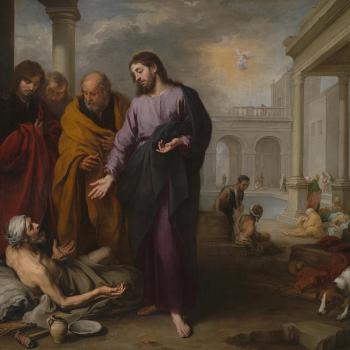![King David as Orpheus in a Synagogue. [Public domain], via Wikimedia Commons](https://wp-media.patheos.com/blogs/sites/637/2017/05/King_David_as_Orpheus_in_a_synagogue_mosaic_-_Google_Art_Project-181x300.jpg)
The demonic songs set our desire in motion and cast the soul into shameful fantasies, but psalms, hymns, and spiritual songs (Eph. 5:19) call the mind to the constant remembrance of virtue, cooling our boiling irascibility and extinguishing our desires. [4]
David, therefore, as a prophet with a spiritual vision; he engaged more than the letter of the law, but the spirit and principles behind the law, so that his knowledge and wisdom became highly developed and the mysteries which he left behind was able to be used by him and other to transcended the ordinary way of knowing. He was able to present the higher path in his psalms, to the contemplative experience of God, as St Maximus the Confessor discerned: “David is the law of the Spirit – the law engendering that peace which so excellently builds for God the temple of contemplation.”[5]
Likewise, David, like Orpheus, could have been said to turn back just for a bit, to look back to his past, to his sin, and so go backwards and find himself lost to sin from time to time, only to use music and prayer as a means of restoring himself in God’s grace. Is there any surprise? As St. Symeon the New Theologian knew, we find that God is merciful, so that our weakness which holds us back can be overcome by God’s grace. David serves as a prime example of God’ mercy. If David could fall and be picked up again, we too, can imitate him in the same fashion:
We have certainly all heard of David, and we admire him and say that he is unique and there cannot be another like him. Yet here, lo and behold, is something more than David. For David was specially chosen by God: he was anointed to be prophet and king; he was inspired by the Holy Spirit; and he was granted many revelations concerning God. Thus when he sinned and was deprived of the grace of the Spirit and of his gift of prophecy, and was estranged from his usual communion with God, is there anything astonishing in the fact that he should recall the state of grace from which he had fallen should ask to enjoy those privileges once more (cf. Ps. 51: 11-2)?[6]
While David’s death was not the same as portrayed for Orpheus, David nonetheless experienced rebellion, the indication that his earthly kingdom would be rent into two, as those who desired his authority for themselves thought they could take it from him. Moreover, David, unlike Orpheus, did not abandon relations with women, but rather pursued them, making for the weakness which would eventually lead to the end of the earthly Israel, even as the grace in his songs, the Spirit which directed him and guided him, would lead David and all who follow out of the cycle of suffering and into the glory of the eternal Jerusalem. David brought forth the pattern and the rites which would establish grace in souls and help Israel and those who read and studied them, to transcend the ordinary human end, realizing that even in death, there is a claim of the Lord upon us all. Certainly David had a limited understanding of what happened after death, and so did not offer full mystery rites like Orpheus, yet it is clear, his rites like Orpheus contained hidden mysteries intended to guide their users into a new relationship with the one true God over all. David is our musician king, the prophet with lyre in his hand who directs our souls through his sacred rites, the psalms, which can even now calm the wild beast within all of us.
David shows us that what we find in Orpheus are truths which we, as Christians, can appreciate and engage. We can see they have universal value. Orpheus represents a religious type existed in history but a type which can be found with us today. We can follow the path Orpheus, filling it with the grace of Christ, elevating it to a higher standard, even as Orpheus’ religious beliefs and rites helped establish the philosophical legacy Christians would take up and use for its own proclamation of the truth. Because music has its own language which can use but does not need words, it has its own means of directing our experience and realizing various truths through such experience. From this, we can also discern that there is something more than mere philosophical training which is being offered in the figure of Orpheus. We have a reminder that our thoughts and words and deeds need to be harmonized together so that in and through that harmony we can enter into communion with the truth which is beyond all words. This David was able to experience, and in the Psalms, he presented to us the fruit that experience. This we can and should experience for ourselves. The myth of Orpheus, realized in Orpheus and David, can be realized today, in the great musicians whose music might even serve us as a means of touching the Spirit of Truth and finding our mind and body healed through it.
[1] Orpheus seems to have taught the immortality of the soul, a cycle of reincarnation which brings suffering to the soul as long as that cycle continues, and that his ritual tradition was believed to free those who were initiated into them from that cycle so they can find unity with the gods. From this, it is often believed that Pythagoras and Plato, among others, continued the Orphic tradition, developing it, sometimes critically, and yet with enough accord that they could be seen as disciples of Orpheus themselves.
[2] Thomas Taylor, Hymns and Initiations (Frome, Somerset: Prometheus Trust 1994), 262.
[3] Marsilio Ficino, “Comment on Chapter Summaries of Phaedrus” in Marsilio Ficino: Commentaries on Plato. Volume I. Phaedrus and Ion. Trans. Michael J.B. Allen (Cambridge: Harvard University Press, 2008), 111.
[4] Evagius, “Praktikos” in Evagrius of Pontus: The Greek Ascetic Corpus. trans. Robert E. Sinkewicz (Oxford: Oxford University Press, 2003), 109.
[5] St Maximos the Confessor, Second Century on Theology in The Philokalia: The Complete Text. Volume Two. trans. and ed. by G.E.H. Palmer, Philip Sherrard and Kallistos Ware (London: Faber and Faber, 1990), 150.
[6] St. Symeon the New Theologian, “On Faith” in The Philokalia: The Complete Text. Volume Four. trans. and ed. by G.E.H. Palmer, Philip Sherrard and Kallistos Ware (London: Faber and Faber, 1995), 19.
Stay in touch! Like A Little Bit of Nothing on Facebook:
A Little Bit of Nothing













